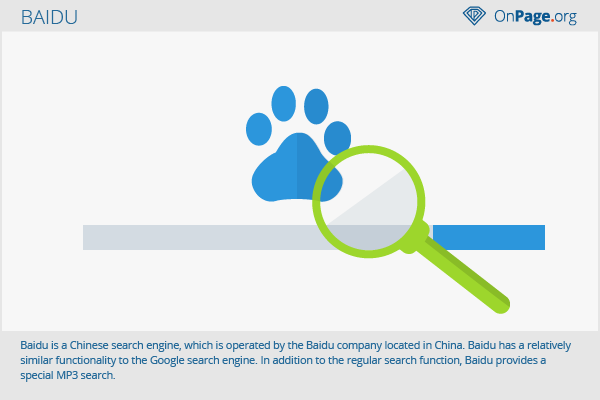Baidu
Baidu is a Chinese search engine, which is operated by the Baidu company located in China.

Logo Baidu (Source: Baidu)
Functions of this search engine
Baidu has a relatively similar functionality to the Google search engine. In addition to the regular search function, Baidu provides a special MP3 search. Moreover, Baidu provides the following functions:
- Baidu Maps (directions)
- Baidu Browser (web browser)
- Baidu Tieba (social network)
- Baidu cloud (online storage)
- Baidu Questions and Answers
- Baidu Library (similar to Google Books, but no book preview)
- Baidu Baike (encyclopedia similar to Wikipedia)
Dissemination of Baidu
In China, Baidu has a market share of about 77 percent. Since 2008, the company has expanded to other countries, mainly in Asia and also shows efforts to spread in developing countries.
Accusation of censorship
The search engine is working closely with the authorities in China and has automatically made itself an instrument of state control over the content which is published and accessible over the Internet in the People’s Republic of China.
Baidu vs. Google
In 2004, Google bought 2 percent of Baidu shares for the price of 5 million US dollars. Just two years later they were resold for the purchase price of 59.5 million dollars. Google was not able to expand its market share in China nearly as strongly as desired and therefore ended their efforts in of 2010.
Importance for search engine optimization
Since the major search engines of our latitudes have only a minor role in China, SEOs cannot get around Baidu if they want to rank well with their websites in the People’s Republic of China. Generally, search engine optimization for Baidu was similar to the measures you would have to take for the Google search engine as of a few years ago. Below are some measures relevant to success with Baidu:
- Great importance of alt tags, heading tags, and meta data (title, description, meta keywords)
- High importance of internal linking
- Extensive link building (quantity still goes before quality here)
- High keyword density (depending on the source 4-10 percent)
- High readability (placement of keywords in images, downloads, and headlines instead of just text)
- Regular new content
- No use of Flash or JavaScript
- Navigation with high usability
It is assumed that Baidu will follow the example of Google sooner or later and devalue some of these ranking criteria or replace it with other criteria. Therefore, it should be ensured that link building is not done randomly, but instead subject-relevant and as natural as possible. Even with keyword density, one should tend to stay towards the bottom edge of the recommendations, because keyword densities from 6 percent up could later be identified as spam and devalued.
To be indexed in Baidu, a web page should be formulated in the ideal case in traditional simple Chinese. Some English websites may have a chance of indexation. But these should already bring with them a certain level of name recognition (such as large well-known brands). Other important factors are hosting the website in China as well as a domain name ending in .cn oder.com.cn. Good chances for success increase in the booking of paid search results. Unlike in Google, the organic search results are not separated from the paid ones on the SERP. The search users thus cannot identify which results are organic and which are not.

